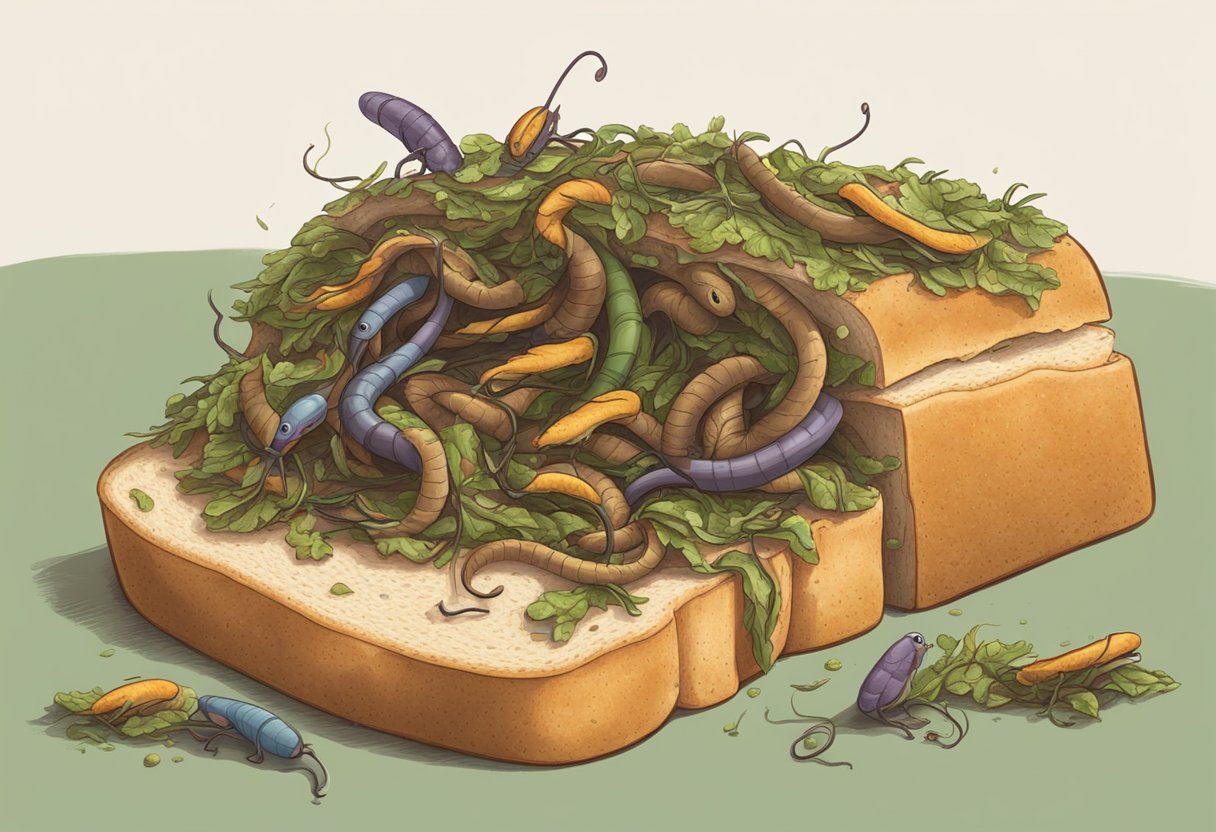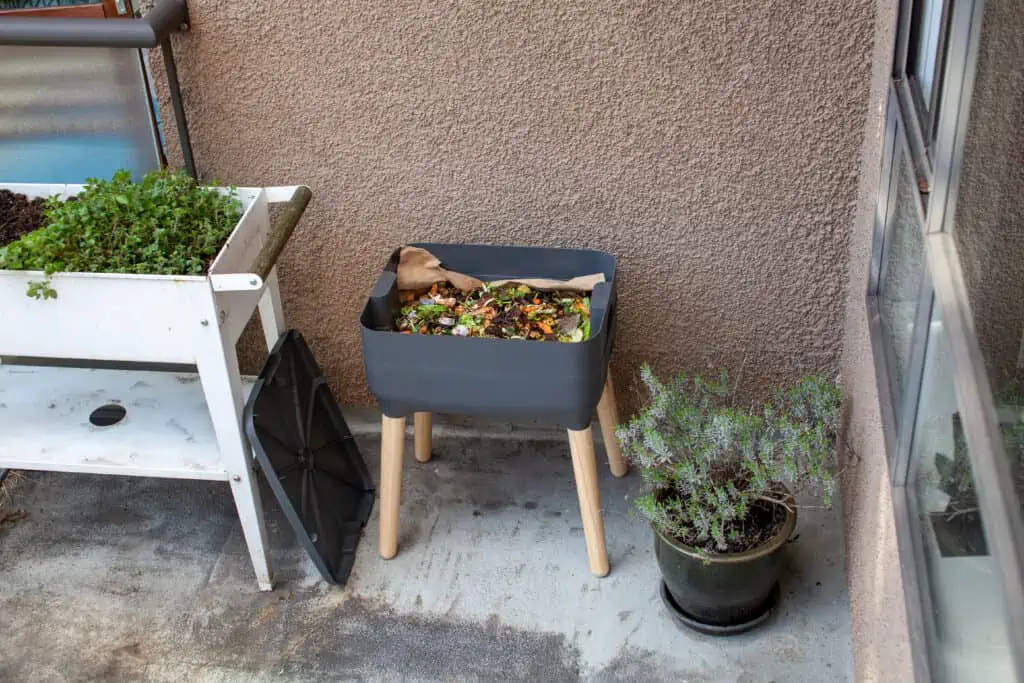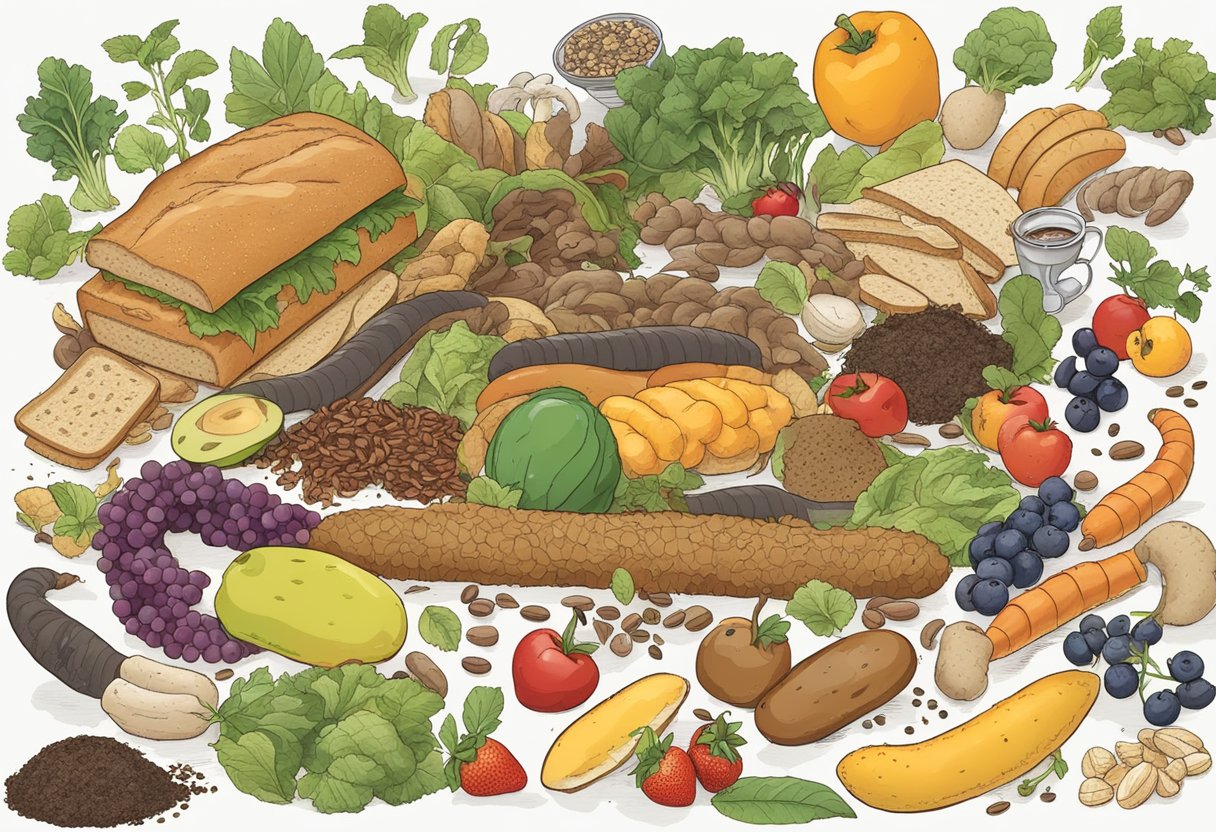As an Amazon Associate I earn from qualifying purchases.
At A Glance
Yes, compost worms can eat bread, but it should be provided in moderation and as a part of a balanced diet of other organic materials like fruit and vegetable scraps. Bread can mold quickly, and molds can potentially harm your worm bin’s ecosystem. It’s advisable to break the bread into smaller pieces and perhaps soak it in water to soften it before adding it to the worm bin. Also, be cautious not to overfeed bread or any food to the worms as excess food can rot and create odors, attract pests, and disrupt the balance in the worm bin.
Composting is an excellent way to reduce your household waste and create nutrient-rich soil for your garden. Composting worms are an essential part of the composting process, as they break down organic matter and turn it into valuable fertilizer. However, not all food waste is suitable for composting worms. One common question that arises is whether compost worms can eat bread.

Bread is a staple food in many households, and it’s easy to end up with stale or moldy bread that needs to be disposed of. Instead of throwing it away, you may wonder if it’s safe to feed it to your compost worms. The answer is yes, compost worms can eat bread, but there are some important things to keep in mind.
Firstly, bread should only be fed to compost worms in moderation. Bread is a high-carbohydrate food that can quickly turn rancid and attract pests if not consumed by the worms. Secondly, it’s crucial to ensure that the bread is cut into small pieces to make it easier for the worms to digest. Finally, it’s best to mix the bread with other compostable materials to provide a balanced diet for the worms. By following these guidelines, you can safely feed your compost worms bread and reduce your food waste.
Understanding Compost Worms

Compost worms, also known as red wigglers, red wrigglers, or red worms, are a type of earthworm that is commonly used in vermicomposting or worm composting. They are different from regular earthworms as they prefer to live in shallow environments and feed on decaying organic matter.
Compost worms are an essential part of the vermicomposting process. They help to break down organic waste into nutrient-rich compost that can be used to fertilize plants. They can eat almost any decaying organic material, including fruits, vegetables, coffee grounds, and eggshells. However, there are some things that they won’t eat, such as meat, dairy, and oily foods.
Compost worms are easy to care for and can be kept in a worm farm or worm bin. They require a moist environment, good ventilation, and a balanced diet to thrive. It’s important to avoid overfeeding them or giving them too much of one type of food, as this can cause problems such as odors, pests, and nutrient imbalances.
Overall, compost worms are a valuable addition to any composting system. They are efficient at breaking down organic waste and producing nutrient-rich compost that can be used to improve soil health and plant growth. By understanding their needs and providing them with a suitable environment, you can ensure that they thrive and help you to create a more sustainable and eco-friendly garden.
What Compost Worms Can Eat
As omnivores, compost worms can eat a wide variety of organic matter. However, it’s important to note that not all food waste is suitable for composting. Here’s a list of what compost worms can eat:
- Fruit scraps: Fruits such as apples, banana peels, and tomatoes are a great source of nutrition for compost worms. However, citrus fruits and their peels should be avoided as they can be too acidic for the worms.
- Vegetable scraps: Composting worms can eat most vegetable waste, including lettuce, cabbage, and cucumber. However, avoid feeding them large amounts of onions or garlic as these can affect the taste of the resulting compost.
- Coffee grounds and tea leaves: Both coffee grounds and tea leaves are excellent sources of nitrogen for compost worms. However, it’s important to avoid feeding them too much as they can make the compost too acidic.
- Bread: Composting worms can eat bread, including stale or moldy bread. However, it’s important to feed them bread in moderation as it can be high in salt and sugar.
- Cooked foods: Composting worms can eat cooked foods, including dairy products and meats. However, it’s important to avoid feeding them large amounts of cooked foods as they can attract pests and cause odors.
- Eggshells: Eggshells are a great source of calcium for compost worms. However, it’s important to crush them before feeding them to the worms as they can take a long time to break down.
- Sawdust and bedding: Sawdust and bedding are great sources of carbon for compost worms. However, it’s important to avoid feeding them too much as they can make the compost too dry.
- Food processor scraps: Composting worms can eat most food processor scraps, including fruits, vegetables, and eggshells. However, it’s important to avoid feeding them large amounts of oily or greasy foods as they can attract pests and cause odors.
- Animal manure: Composting worms can eat most types of animal manure, including cow, horse, and chicken manure. However, it’s important to avoid feeding them pet waste or manure from animals that have been treated with antibiotics.
In general, it’s important to avoid feeding compost worms large amounts of any one type of food waste. Instead, try to provide them with a balanced diet of both nitrogen-rich and carbon-rich materials. This will help ensure that they stay healthy and that your compost is of high quality.
What Compost Worms Should Not Eat

As a worm farmer, it’s important to make sure you’re feeding your composting worms the right foods to keep them healthy and thriving. While there are many things that worms can eat, there are also a number of things that they should avoid.
First, avoid feeding your worms citrus fruits like lemons, limes, and oranges. These fruits contain high levels of acidity that can harm your worms and even kill them. Pineapple is also acidic and should be avoided.
Oily or fatty foods should also be avoided. This includes processed foods, as well as foods that contain preservatives. Dairy products like cheese and cream cheese should also be avoided.
Allium plants like onions and garlic should not be fed to your worms as they can give the compost an unpleasant odor. Spicy foods should also be avoided as they can irritate your worms.
Rotten or moldy food should not be fed to your worms. Pesticides, bones, plastic, and glass should also be avoided as these items can harm your worms and contaminate your compost.
Overall, it’s important to give your composting worms access to a balanced diet they can safely eat. By avoiding the foods listed above, you can help ensure that your worm bin remains healthy and productive.
Importance of a Balanced Diet for Compost Worms
As someone who has been composting with worms for several years, I can confidently say that a balanced diet is crucial for the health and well-being of compost worms. Just like any other living organism, worms need a variety of nutrients to thrive.
A balanced diet for compost worms consists of a mix of carbon-rich and nitrogen-rich materials. Carbon-rich materials include items such as shredded paper, cardboard, dried leaves, and sawdust. Nitrogen-rich materials include food scraps, coffee grounds, and grass clippings.
When compost worms are fed a balanced diet, they are able to break down the organic matter in their environment more efficiently. This results in a higher-quality compost that is rich in nutrients and beneficial microorganisms.
In addition to providing the necessary nutrients for compost worms, a balanced diet also helps to maintain soil health. When compost worms are fed a diet that is too high in nitrogen, it can lead to an imbalance in the soil’s pH levels. This can result in the growth of harmful bacteria and fungi, which can negatively impact plant growth.
Overall, a balanced diet is essential for the health and well-being of compost worms. By providing them with a mix of carbon-rich and nitrogen-rich materials, you can ensure that they are able to break down organic matter efficiently and produce high-quality compost that is beneficial for soil health.
Potential Risks and Solutions
When adding bread to a composting worm bin, there are several potential risks to consider. First, bread can attract rodents, rats, and other vermin to the bin. To avoid this, it is important to bury the bread scraps deep within the bedding material. This will make it less accessible to rodents and other pests.
Another potential risk of adding bread to a worm bin is the growth of fruit flies. Fruit flies are attracted to the sugars in bread and other food scraps. To prevent fruit fly infestations, it is important to cover the food scraps with a layer of bedding material.
Mold growth is also a concern when adding bread to a worm bin. Mold can release spores that can be harmful to both humans and worms. To prevent mold growth, it is important to keep the bin well-aerated and to avoid adding too much bread at once. If mold does start to grow, it is best to remove the affected bedding material and replace it with fresh material.
Finally, adding too much bread to a worm bin can create anaerobic conditions. Anaerobic conditions occur when there is not enough oxygen in the bin. This can lead to the growth of harmful bacteria and the release of unpleasant odors. To prevent anaerobic conditions, it is important to add bread in moderation and to mix it well with other bedding materials.
Overall, while bread can be a great addition to a composting worm bin, it is important to be aware of the potential risks and to take steps to mitigate them. By burying bread scraps deep within the bedding material, covering them with a layer of bedding, avoiding adding too much bread at once, and keeping the bin well-aerated, you can ensure that your worm bin remains healthy and productive.
